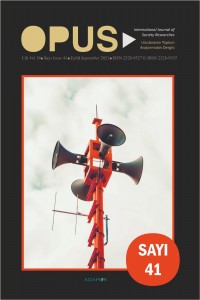Abstract
The Covid19 pandemic, which has affected the whole world, has increasingly affected all areas of social life, especially in the field of health. Although the health area is partially prepared for the process due to its natural structure, many difficulties are encountered. This process, in which all aspects of the education field are caught unprepared, are tried to be overcome with as little damage as possible. In this process, higher education levels of education try to manage the process by putting their distance education systems into use urgently. Although students experience individual technical difficulties in the teaching of theoretical courses, they can overcome their deficiencies by watching the repetition of the course. It can be said that there are a lot of problems in the applied areas of art-based programs. Individual instrument lessons in music education is one of these application areas. In addition to theoretical and technical studies, it is thought that the distance education system is not the solution in instrument training based on the master-apprentice tradition by imitating the student's teacher. In addition to teacher-student cooperation, the current system can be structured by taking such lessons into consideration in order for the process to function properly. In this study, the difficulties that have been observed and experienced since the beginning of the pandemic were tried to be evaluated from a sociological perspective and the difficulties in individual instrument lessons were tried to be defined.
References
- Bayhan, V. (2015). A new model in the field of application of educational sociology: School sociologist and his duties. Journal of Sociology, 30(1), 255-274.
- Birkök, M. C. (2000). A Conceptual Analysis of Distance Educational Functions and Perspectives in Sociology. Turkish Online Journal of Distance Education, 1(2).
- Girgin, D. (2015). Expectations from teacher and student perspectives in instrument training in music education departments. Education Sciences, 10(3), 169-183.
- Gökalp, Z. (1976). Articles I. Ankara: Ministry of Culture Publications.
- Karakaş, M. (2020). The multidimensional sociology and new normal issue of the Covid-19 pandemic. Istanbul University Journal of Sociology, 40(1), 541-573.
- Özmenteş, S. (2013). Student motivation and performance in instrument education: Journal of Education and Teaching Research, 2(2), 320-331.
- Özoğlu, M. (2020). Pandemic glossary. www.tr.euronews. Date of Access: 29 December 2020.
- Yalçınkaya, B. Eldemir, A. C. and Sönmezöz, F. (2014). Evaluation of music teacher candidates' attitudes towards individual instrument lesson. Turkish Studies, 9(2), 1583-1595.
Abstract
Tüm dünyayı etkisi altına almış olan Covid19 pandemisi başta sağlık alanı olmak üzere sosyal hayata ilişkin tüm alanları artan bir şekilde etkisi altına almıştır. Sağlık alanı doğal yapısı gereği sürece kısmen hazırlıklı olsa da birçok zorluk yaşanmaktadır. Eğitim alanının ise tüm boyutları hazırlıksız yakalandığı bu süreç elden geldiği ölçüde az zararla atlatılmaya çalışılmaktadır. Bu süreçte Eğitimin yüksek öğrenim kademeleri, kendi uzaktan eğitim sistemlerini acilen kullanıma sokarak süreci yönetmeye çalışmaktadır. Teorik derslerin işlenişinde öğrenciler bireysel teknik olanaksızlıklar yaşasa da ders tekrarlarını izleyerek eksiklerini giderebilmektedir. Sanat içerikli programların uygulamalı alanlarında ise fazlasıyla sorun yaşandığı söylenebilir. Müzik eğitiminde bireysel çalgı dersleri bu uygulama alanlarından biridir. Teorik ve teknik çalışmaların yanında öğrencinin öğretmenini taklit ederek, usta-çırak geleneği temel alınan çalgı eğitiminde uzaktan eğitim sisteminin çözüm olmadığı düşünülmektedir. Sürecin sağlıklı işleyebilmesi için öğretmen-öğrenci iş birliğinin yanında mevcut sistem bu tarz dersleri de göz önüne alarak yapılandırılabilir. Bu çalışmada, pandeminin başından itibaren gözlemlenen, yaşanan sıkıntılar sosyolojik bir bakış açısı ile değerlendirmeye çalışılarak bireysel çalgı dersleri içerisindeki zorluklar tanımlanmaya çalışılmıştır.
References
- Bayhan, V. (2015). A new model in the field of application of educational sociology: School sociologist and his duties. Journal of Sociology, 30(1), 255-274.
- Birkök, M. C. (2000). A Conceptual Analysis of Distance Educational Functions and Perspectives in Sociology. Turkish Online Journal of Distance Education, 1(2).
- Girgin, D. (2015). Expectations from teacher and student perspectives in instrument training in music education departments. Education Sciences, 10(3), 169-183.
- Gökalp, Z. (1976). Articles I. Ankara: Ministry of Culture Publications.
- Karakaş, M. (2020). The multidimensional sociology and new normal issue of the Covid-19 pandemic. Istanbul University Journal of Sociology, 40(1), 541-573.
- Özmenteş, S. (2013). Student motivation and performance in instrument education: Journal of Education and Teaching Research, 2(2), 320-331.
- Özoğlu, M. (2020). Pandemic glossary. www.tr.euronews. Date of Access: 29 December 2020.
- Yalçınkaya, B. Eldemir, A. C. and Sönmezöz, F. (2014). Evaluation of music teacher candidates' attitudes towards individual instrument lesson. Turkish Studies, 9(2), 1583-1595.
Details
| Primary Language | English |
|---|---|
| Subjects | Other Fields of Education, Sociology |
| Journal Section | Articles |
| Authors | |
| Publication Date | September 1, 2021 |
| Acceptance Date | April 7, 2021 |
| Published in Issue | Year 2021 Volume: 18 Issue: 41 |


